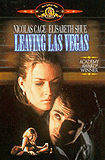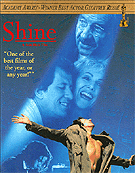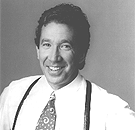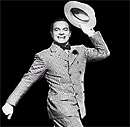
|
| From
the Field |
|
|
 With
the LA
Area Emmys just days away, we talk with the
guy who understands the real significance of winning
such an award. As Vice President of The Academy
of Television Arts and Science in North Hollywood,
John oversees Emmy competitions from the Primetime
Emmys to the upcoming LA Area Emmys June 23rd, 2001
at the Pasadena Civic Auditorium..... With
the LA
Area Emmys just days away, we talk with the
guy who understands the real significance of winning
such an award. As Vice President of The Academy
of Television Arts and Science in North Hollywood,
John oversees Emmy competitions from the Primetime
Emmys to the upcoming LA Area Emmys June 23rd, 2001
at the Pasadena Civic Auditorium..... |
|


FAQ's About The Emmys
By John Leverance
What do awards do?
Awards are meant to distinguish the extraordinary from the ordinary.
They break through the shelf clutter of our crowded popular
culture. They bring recognition to the award recipient. They
provide an imprimatur of quality that guides public taste and
consumption.
Can awards reverse the fortunes of TV shows and movies?
TV Shows Languishing in the Nielsen ratings in the spring of
1981, Hill Street Blues' future on the NBC network' fall schedule
was in question. But on August 6, the Academy of Television
Arts & Sciences made the startling announcement that Hill Street
Blues had garnered a record number of drama series nominations
for the Primetime Emmy Awards.
Five weeks later, on the CBS broadcast of the awards presentation,
66 million viewers witnessed Emmys being awarded for writing,
directing, lead actor and actress, supporting actor and the
big one - outstanding drama series.

Back in the 1980s, NBC's "Hill Street Blues," a police
drama series that was critically acclaimed but hadn't
drawn a broad audience, won Emmys for acting, writing
and best dramatic series. The show was saved from cancellation.
|
Added to the two technical awards won at a non-televised awards
presentation, Hill Street Blues garnered more Emmys in its premiere
season that any other series in the 33-year history of the Emmys
- a record that has not been broken in the ensuing 15 years.
On that September evening in 1981, the Primetime Emmy Awards
fulfilled the purpose of awards, which is to recognize accomplishment
in a personal, professional or social endeavor and, by means
of that recognition, afford the accomplishment an extraordinary
place within its ordinary milieu. And by the end of the telecast
of September 13, 1981, the Emmy Awards had positioned Hill Street
Blues as a primetime contender.

The success of "Leaving Las Vegas" demonstrated
how awards can generate attention |
Movies
Both the Los Angeles and New York film critics announce their
picks for the best movies and performances at the end of every
calendar year. In effect, they are the beginning of the march
to the Oscars in late March. In what way are they important?
According to Gerry Rich, president of worldwide marketing for
MGM//UA."For films like 'Shine' or 'Crying Game' - smaller films
in limited release without $20-million advertising budgets to
back them up - these awards are a way of penetrating the public
consciousness. Last year, they created curiosity about 'Leaving
Las Vegas' and generated considerable editorial space. Particularly
for the more discriminating art-house crowd that doesn't go
to movies each week, these nods anoint a picture as a 'must-see'
and uncover hidden gems. It's hard to break through the clutter
and that's where critics come in."

"For films like "Shine" and the "Crying
Game," these awards are a way of penetrating the
public consciousness |
How did the Emmys get started? Where does the name "Emmy"
come from?
The Academy of Television Arts & Sciences was originated
in 1946 as a discussion group among a small set of people who
were working in the new medium. There was a lot to discuss:
--what would be shown on television; --how to improve the technical
quality of the recording and transmission of the television
image; --how to build and expand the new medium.
Beginning as a practical forum for the exchange of views on
scientific, aesthetic, financial and legal topics, the Academy
was comprised of a group of television pioneers who initially
got together to bring some collegiality and social interaction
to the semi-isolation of their commercially marginal, relatively
experimental business. Because they were in the television business,
they talked about picture tubes, transmission lines, studio
audiences, selling to sponsors, the effect of hot lights on
makeup, the possibility of getting established radio stars to
appear on their shows, and a host of other questions pertinent
to 1946 television in Los Angeles.
A working definition of a professional society is a collection
of individuals who seek an exchange of ideas and discussion
of common problems within their profession. While the ultimate
goal of a trade association is increased income from its product
or service, the goals of professional societies are commonly
considered to point more towards the expansion of knowledge,
or the establishment of professional standards. Within two years
of its inception, the little discussion group saw the possibility
of developing standards of excellence for television programming
- and awarding them. The members knew that awards could be used
to recognize outstanding achievement in their burgeoning industry.
After all, the Motion Picture Academy had been rewarding excellence
in movies since the 1920s with its "Oscar," so why
couldn't the TV Academy begin rewarding excellence in television
with its own award, the "Emmy"? (Emmy is a feminization
of "Immy," engineering slang for the image orthicon
tube, an early picture tube. Legend has it that "Oscar"
got his name because he looked like Betty Davis' husband, Oscar.)
To do great things, Emmy had to have a great look. Like Oscar,
she needed a shiny gold plate and a metaphoric base - Oscar
stood on a film reel, Emmy on a global grid - but that was where
the comparison stopped.

The name is a feminized form of "Immy," a nickname for
the image orthicon tube that equipped televisions of
the time. |
Unlike the art deco sentry of the Motion Picture Academy, Emmy
appeared as a lithe, art nouveau muse of art who exalted the
electron of science. In this one image, her designer (Louis
McManus) created a beautiful statuette and a personification
of the academy's aim, "To further the arts and sciences
of television."
The Emmys were first awarded at the Hollywood Athletic Club
on January 25, 1949. The first five Emmys went to the most popular
television program ("Pantomime Quiz"), best film made
for television ("The Necklace"), most outstanding
tv personality (Shirley Dinsdale and her puppet Judy Splinters),
a technical award for a "phasefinder," and a station
award to Los Angeles broadcast pioneer KTLA.
Might little Emmy grow up like Cousin Oscar, who had brought
so much recognition to the family of motion pictures? If Oscar
could bring standing and prestige to the movies, couldn't Emmy
could do the same for television? If so, the awards would truly
represent the professional purpose of their parent association,
further the goals of the association and reflect its values.
It seems that every year a major award omits an important
entry, with a resulting flap and general embarrassment. Tim
Allen's non-entry into the Emmys a couple years ago comes to
mind. Why is this a recurring problem?
Because people rely on agents, managers, producers and others
to make the entries for them. Generally these handlers take
care of it. Sometimes they let them fall through the cracks.

"Home Improvement" star Tim Allen was left off ballots
for Emmy Award consideration in 1994 |
Or, in the recent case of a hit songwriter excluded from the
Grammy ballot, politics appears to intervene. Songwriter Jim
Steinman thought that his single, "It's All Coming Back to Me
Now," (on Celine Dion's "Falling Into You" album) would be entered
by Sony Music, the album's record company.
According to the Los Angeles Times, Sony did enter the song
in a number of categories but not the one that would have put
Steinman into eligibility to win a songwriting Grammy. Steinman's
manager said "he was told the song was left off for fear that
it possibly would cancel out another Dion hit, "Because You
Loved Me," written by Diane Warren and appearing on the same
album.
As a result, "It's All Coming Back to Me Now" - which ranks
among the most-played songs on radio this year and which catapulted
the Dion album to the national No. 1 spot last summer - is not
among the 511 best song entries...
The case recalls recent incidents: "Home Improvement" star Tim
Allen was left off ballots for Emmy Award consideration in 1994,
and the much-lauded basketball documentary "Hoop Dreams" failed
to receive an Academy Award nomination in 1995. But Allen's
omission was due to a simple filing error by his show's staff,
and "Hoop Dreams" was left out due to a nominating committee's
judgment, not deliberate decisions based on record company politics
and marketing strategies. "It's wrong to put this in the hands
of a record company and let politics take over," [said Sonenberg's
agent].
Any academy member can submit a song or artist for consideration,
but in practice it largely has been left to the record companies...Sonenberg,
in fact, is a member. But he says that based on past experience
he had no reason to believe his client's song would not be submitted
by Sony, and was unaware that it hadn't been until the deadline
had passed. [Los Angeles Times, 12/4/96 F1, F5 "The Politics
of Grammys Hit a Sour Note" by Steve Hochman]. The incontrovertible
lesson of the unfortunate omissions of both Tim Allen (Emmys)
and Jim Sonenberg (Grammys) is if you want to make sure your
entry gets on the ballot, enter it yourself!
Disqualifications are another recurring awards problem. A
couple years ago the TV Academy disqualified a nomination for
Dennis Miller. What happened?
Most Primetime Emmy Awards entries are incorrect or incomplete.
If they are not corrected, they can cause significant problems
in the subsequent phases of the competition. The Dennis Miller
disqualification is a case in point.

Dennis Miller disqualification is case in point.... |
Dennis Miller Live! on HBO was entered in the 1995 Primetime
Emmy Awards in Category 62 - "Variety, Music or Comedy
Series." This is the category that pits Variety, Music or Comedy
Series - mainly late-night talk shows like The Tonight Show
Starring Jay Leno and Late Night With David Letterman against
one another.
If Dennis Miller Live! went on to win, Emmys would be awarded
to the producers and, as the rules state, the "Host if
his/her name is in the program title." Since Dennis Miller's
name was in the program title, he would win an award as host
if the series won. Because he had mandatory eligibility with
the team of producers in Category 62, Miller could not make
another entry in Category 54, which is for hosts/performers
in variety-music-comedy programs. The reason he could not make
the additional entry goes back to a basic tenet of the Emmys
(and most awards): a person is limited to one Emmy per achievement.
If he were allowed to enter as host of Dennis Miller Live! in
Category 62 (programs competing against programs) and again
in Category 54 (individuals competing against individuals),
he could potentially be nominated and win two Emmys for the
single achievement of being host of his show. But an incorrect
entry was made on behalf of Miller by his producer in Category
54. It was an inadvertant error, but it should have been corrected
- thrown out of eligibility - before it was placed on the Performer
Ballot.
Unfortunately, the error was not caught until after Miller was
announced as one of the nominees in Category 54. At that point
a representative from Politically Incorrect With Bill Maher
called to ask why Bill Maher - whose eligibility in both Category
62 and 54 was parallel to Dennis Miller's eligibility in those
two categories - had been denied entry in Category 54 and Miller
had not. The Academy's response was that an error had been made
and would be corrected at once. Regrettably, there was no recourse
but to disqualify the nomination. Per a Primetime rule, ineligible
entries must be disqualifed at any stage of the competition
- even after they had emerged from the pack as nominations.
Mr. Miller followed up with a gracious press release to the
effect that mistakes will happen and that Barbara Streisand,
who was also nominated in the category (and a favorite for the
Emmy that she ultimately won,) "could now get some sleep."

Bob Hope is "The Most Honored Individual in the Entertainment
Industry." |
Who is the most awards-honored person in entertainment?
According to the Guiness Book of World Records, Bob Hope is
"The Most Honored Individual in the Entertainment Industry"
after receiving more than 100 national and international honors,
53 of which were academic honors. He has received four special
Academy Awards, an Emmy [in 1996 for "Outstanding Variety Special,"
Chrysler Presents The Bob Hope Christmas Special, a Peabody,
an Order of the British Empire and Distinguished Service medals
from all branches of the armed forces.
About the Author
JOHN LEVERANCE is the Vice President of The Academy of Television
Arts and Science in North Hollywood, John oversees Emmy competitions
from the Primetime Emmys to the upcoming LA Area Emmys June
23rd, 2001 at the Pasadena Civic Auditorium.....
|
|
|
|
| |
|

















